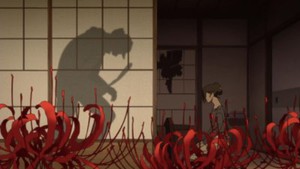Classic Review: Paranoia Agent
Episode 11
by Nick Creamer,

Paranoia Agent returned to its original narrative this week, with an episode that introduced us to the former police chief Keichi Ikari's delicate wife. Having possessed a weak constitution since childhood, Mrs. Ikari never felt her life would amount to much; but having survived many ups and downs along the way, she's determined to cling to the life she still has. Through a series of monologues contrasted against the former chief going about his busy daily life, Mrs. Ikari makes a defiant case directly to Shonen Bat, laying out the clear value of her own life and challenging the monstrous child on the reasons he attacks his targets.
Compared to last week's complex narrative web and creative aesthetic adventures, this was a relatively straightforward episode of Paranoia Agent. It was centered on two concurrent threads - Keichi's wife detailing the twists and turns of her life story to Shonen Bat directly, and Keichi himself running from job to job as he struggled to pull the pieces of his life together. Confronted by Shonen Bat in her home in a moment of weakness, Mrs. Ikari ended up scolding the murderer, and insisting he sit down and listen to her explain the strength of human nature.
This led to a long sequence using this episode's one great visual trick, an interview conducted between Mrs. Ikari on the one side and Shonen Bat on the other, concealed as a shadow behind a sliding door as she explained the pitfalls and small victories of her life with Keichi. As Mrs. Ikari fell into despair, Shonen Bat would grow larger and more frantic; as she steeled herself and accepted the failings of the past, he'd quiet down and lower his bat. It was a simple conceit, but a strong one; the ways this show's second half have complicated its depictions of Shonen Bat have almost all been successful experiments, and Mrs. Ikari's story ended up painting a more full and sympathetic portrait of Keichi himself.
Scattered between these monologue segments, we also got many scenes of Keichi running from construction job to traffic job to security job, frantically trying to make ends meet. As Mrs. Ikari lovingly recalled her husband urging her to accept reality, we saw Keichi standing tired on the train, listening to teenagers wish Shonen Bat would attack their school as he headed off to one more low-paying position. Keichi's “kids these days” posturing felt bitter and out of touch back when we only saw his professional face, but adding the context of the dignity he maintains even in defeat gave a real humanity to his feelings.
Of course, Kon almost never lets his characters enjoy an honest victory, and so both of these narratives were challenged in the episode's later scenes. On Mrs. Ikari's side, it's clear basically from the start that her “Shonen Bat” is an internal foe, and that the person she is defiantly arguing with has to be some element within herself. This deception is given depressing context later on, when we learn that her long illness has actually affected her mind, meaning she might well have truly believed she was arguing with Shonen Bat even as she sat alone in an empty house. And on Keichi's side, what begins as an endearing reunion with an old burglar (someone who strongly echoes Keichi's obsession with doing things the old-fashioned ways, complete with that vintage matchbox the show keeps returning to) ends up shifting into idyllic farce, as Keichi consoles his feelings of the world moving past him by embracing a flat vision of a “traditional Japan” he never actually experienced. Keichi's insistence on “facing reality” rings a little hollow when his own happiness depends on embracing a false past, and Mrs. Ikari's determination to show the strength of humanity feels somewhat undercut by the fact that she's sitting alone in a decaying home, waiting for a husband she reveres who's lost in his own delusions of the world.
This was a mean episode, in short. Paranoia Agent is a pretty mean show in general, but this one was relentless in its attacks on its own characters, and seemed to take a sneering satisfaction in pulling the legs out from under Mrs. Ikari's humanitarian rhetoric. If there's any solace to be found in this episode, it's in another form of criticism turned backwards - the fact that Keichi really deserves better than this life, and that a society who abandons people like Keichi to the drudgery of menial labor has to be far more at fault than a man who simply can't change with the times. On the aesthetic front, the execution here felt less precisely calibrated than the best episodes; there were definitely highlights (like the shadow-play of Shonen Bat, or the uniquely flat-perspective style adopted for Keichi's fantasy past), but the direction overall felt less consistently purposeful and tonally charged than episodes like the last one, or the first arc's best. But this was still a fine episode, even if it left me all the more worried Paranoia Agent is going to end in the same kind of cynical doldrums that make Keichi a victim of his own expectations.
Rating: B+
Nick writes about anime, storytelling, and the meaning of life at Wrong Every Time.
The views and opinions expressed in this article are solely those of the author(s) and do not necessarily represent the views of Anime News Network, its employees, owners, or sponsors.
discuss this in the forum (110 posts) |
back to Classic Review: Paranoia Agent
Episode Review homepage / archives